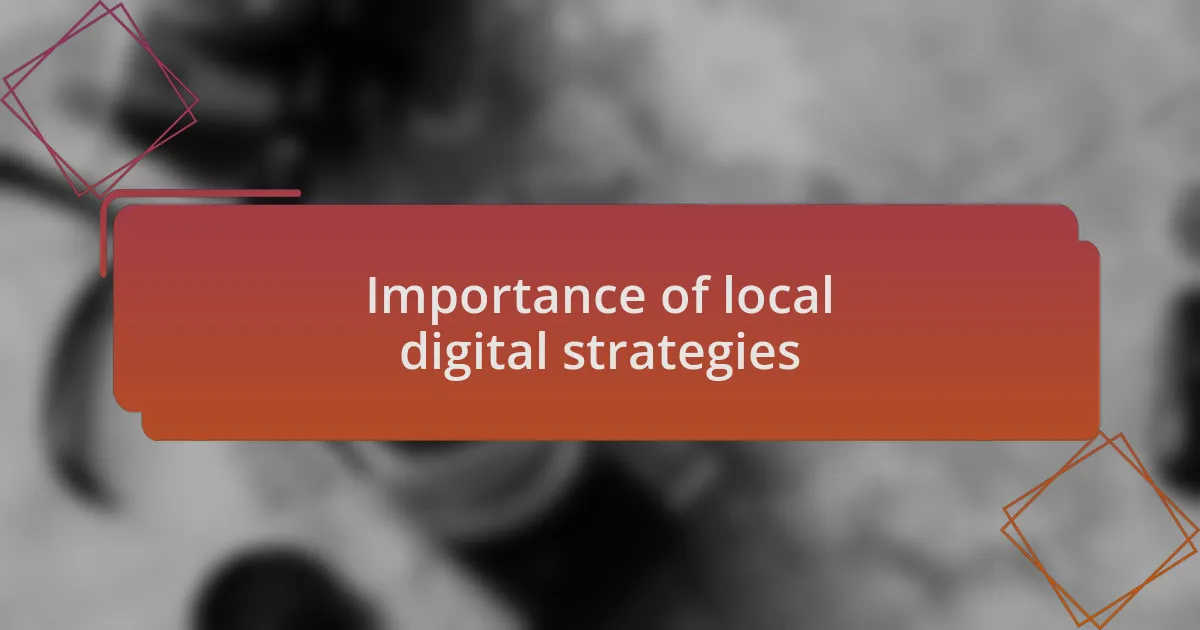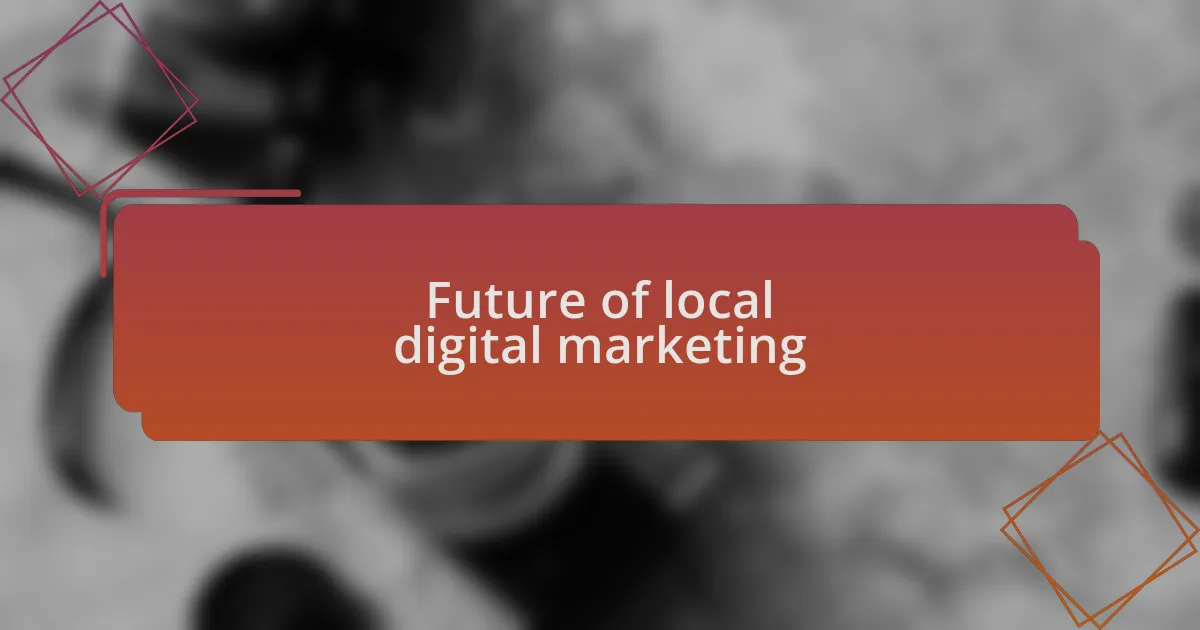Key takeaways:
- Local search engines enhance user discovery of businesses based on location, user reviews, and proximity, showcasing the importance of online presence.
- Effective local digital strategies, such as local SEO and community engagement, help businesses build loyal customer bases and establish credibility.
- Analyzing market trends through consumer behavior can guide businesses to adapt offerings, reflecting local culture and enhancing their connection to the community.
- The future of local digital marketing is shifting towards personalization and AI integration, fostering deeper customer connections and community-driven content.

Understanding local search engines
Local search engines are designed to connect users with businesses and services in their immediate geographic area. When I first started using local search tools, it was eye-opening to see how my search patterns shifted. Instead of broad queries like “restaurants,” I began typing “best coffee near me,” which dramatically impacted how I discovered local spots.
One fascinating aspect is the algorithms behind these search engines, which prioritize location-based relevance. Have you ever wondered why certain businesses pop up first in your search results? It’s often due to factors like user reviews and proximity to your location. I’ve noticed that a single positive review can significantly boost a local business’s visibility, making it feel like those voices truly matter.
Engaging with local search engines often highlights how intertwined our online and offline lives are. For instance, I remember a time when a quick search for a nearby bookstore led me to stumble upon a community event I wouldn’t have considered attending otherwise. This experience underscored the transformative power of local searches—they not only guide us to products and services but also open avenues for community connection and interaction.

Importance of local digital strategies
Local digital strategies are essential for businesses wanting to thrive in their communities. I vividly recall a small bakery in my neighborhood that decided to optimize its online presence. By focusing on local SEO, they not only attracted more customers but also built a loyal following that valued their unique offerings. It makes me wonder how many local gems are out there, waiting to be discovered through effective digital practices.
Consider how local digital strategies can significantly enhance customer engagement. I once participated in a workshop organized by a local florist that utilized social media to highlight seasonal arrangements. The real-time feedback and direct interaction with customers fostered a sense of belonging, making me feel personally connected to their brand. Who doesn’t want to feel valued and heard?
Moreover, a robust local digital strategy helps in establishing credibility and authority. For instance, when a friend of mine searched online for trusted contractors, he turned to businesses with a solid online reputation and engaging content. This emphasis on reliability made a lasting impression on him, illustrating just how impactful a strategy can be in shaping perceptions within a community. It leaves me reflecting on how online presence can cultivate a project’s potential success.

Analyzing local market trends
Analyzing local market trends requires a keen eye on consumer behavior and preferences. I remember attending a local farmers’ market where vendors shared insights about what products were in demand. Their observations on changing tastes, like a sudden surge in interest for organic produce, not only affected their offerings but also highlighted the importance of being adaptable. It made me realize how quickly trends can shift, and the value of monitoring these changes diligently.
In my experience, leveraging tools like Google Trends or local social media insights can arm businesses with valuable data about their community’s interests. For instance, a local gym I frequent began offering wellness workshops after noticing an increase in searches for fitness and nutrition resources. This proactive adaptation resonated with their members, leading to greater participation. Isn’t it fascinating how local businesses can pivot and thrive by simply listening to their communities?
Trends aren’t just numbers; they’re reflections of our local culture and lifestyle. A nearby coffee shop adapted their menu based on emerging trends in specialty drinks that patrons were raving about online. Observing their evolution made me feel more connected to the community, reinforcing the idea that businesses can flourish by staying attuned to local conversations. Isn’t it compelling to think how these insights can shape a neighborhood’s unique identity?

Future of local digital marketing
The future of local digital marketing is undoubtedly leaning towards a more personalized approach. I’ve noticed that consumers increasingly expect brands to understand their specific wants and needs. For example, a local bookstore near my home personalized their recommendations by utilizing customer purchase history, creating a more engaging experience that kept readers coming back. Isn’t it rewarding when brands remember our preferences?
Another exciting aspect is the integration of artificial intelligence (AI) into local marketing strategies. Just the other day, I spoke with a friend who runs a local bakery, and they mentioned using AI-driven chatbots to manage customer inquiries about their daily specials. This not only streamlined their operations but also helped them connect with customers in real-time. Isn’t it amazing how technology can enhance those personal touches that we cherish?
Looking ahead, I believe we’ll see an increased reliance on community-driven content, where locals generate discussions around businesses and experiences. I recall reading a vibrant review on a local platform about a hidden gem of a taco truck. That review not only brought in customers but also fostered a sense of community pride. How do you think such organic marketing strategies will shape the identity of local businesses in the years to come?